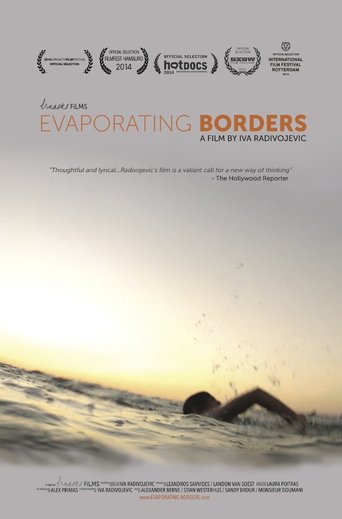keithmiller-201-489988
Evaporating Borders starts with a soft voice over and a spellbinding image of the sea seen through a small, ancient window. Like the movie, we quickly go to the other side of that window, engaging deeply in the human face of the complex issues of immigration, identity, nationalism and personal experience of what it means to find a home. I first learned of Iva Radivojevic's work through her beautiful series of short bio-docs on her site ivaasks.com. In those, as in this movie, she has a way to get simultaneously to the politics of an issue and an identity while never for a frame losing the complex humanity and beauty of the people and issues discussed. I would like to guess it is the calm shock of aesthetics that makes this happen, but I secretly feel it must be the director herself and her proximity to the people, places and issues she touches. Through her very personal lens and voice, this movie takes us into a geo-political issue in a way that feels individual and lived.It may be the best documentary (or un-documentary) you see this year.
Martyna Starosta
"Evaporating Borders" is a striking film essay about the experience of asylum seekers in Cyprus. Watching this essay unfold felt like embarking on a challenging journey. The film combines poetic yet concise observations of current events with the filmmaker's thoughts about identity, belonging and displacement in the context of a globalized economy. I really appreciated that Radivojevic decided to include people with a wide range of political opinions in her film. She was able to do justice to a controversial subject and at the same time I always felt that she was treating the stories of the refugees with empathy and respect. Her thoughtful approach made me think of a kaleidoscope where the viewer can never grasp the full picture because it's constantly in flux. This approach might be challenging for an audience that is used to clear-cut advocacy films with simple recipes on how to fix complex problems. But I believe that we also need subtle narratives, which challenge us both intellectually and emotionally. I am sure that we can use "Evaporating Borders" as an important tool to spark conversations about the human rights of migrants in our communities.
JustCuriosity
Evaporating Borders was reasonably well-received in its North American premiere at the SXSW Film Festival. The film was an attempt to examine the complex issues of migration in the complex cauldron that is the island nation of Cyprus. The film moves slowly through a series of vignettes of various migrants on the island. The director, Iva Radivojevic, a Bosnian immigrant herself, attempts to present the stories in a somewhat poetic manner, but it comes off as somewhat muddled, confusing and a bit disjointed. Rather than relying on a single narrative or speaking with experts who can clarify the history, the law, and the politics, the director relies on the stories and the images to speak for themselves. This technique presents a very human narrative, but one that feels a bit incomplete. The film does manage to highlight the dangerous trend of fascist anti-immigrant groups that is growing in Cyprus – as in many other parts of Europe and U.S. – but doesn't really clarify their influence or power within the political structure in Cyprus. While the film draws an important humanizing spotlight to a country that is often ignored, but it seems to leave a murky incomplete picture. There is no real effort to offer specific policy solutions to the problems that the film raises. The film feels like it is a good first effort by a student director, but one that still needs considerably more editing and reworking to be a fully complete project.
